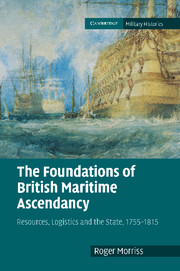Book contents
- Frontmatter
- Contents
- List of tables
- Preface
- Glossary of British weights, measures, casks and money values
- List of abbreviations
- Introduction
- 1 The British state in evolution
- 2 Defence and expansion
- 3 Economy and finance
- 4 Naval growth and infrastructure
- 5 Ordnance and technology
- 6 Manpower and motivation
- 7 Foodstuffs and victualling
- 8 Shipping and transportation
- 9 The supply of land forces overseas
- Conclusion
- Bibliography
- Index
9 - The supply of land forces overseas
Published online by Cambridge University Press: 10 January 2011
- Frontmatter
- Contents
- List of tables
- Preface
- Glossary of British weights, measures, casks and money values
- List of abbreviations
- Introduction
- 1 The British state in evolution
- 2 Defence and expansion
- 3 Economy and finance
- 4 Naval growth and infrastructure
- 5 Ordnance and technology
- 6 Manpower and motivation
- 7 Foodstuffs and victualling
- 8 Shipping and transportation
- 9 The supply of land forces overseas
- Conclusion
- Bibliography
- Index
Summary
Britain's military operations overseas demanded an organisation to meet the local needs of an army on campaign or serving as a garrison. This gave rise to the Treasury's Commissariat. At the beginning of the Seven Years' War the Commissariat did not exist; by the beginning of the Napoleonic War it was virtually an established department of government. Although the Commissariat was wound up at the end of each war, methods of management developed in the Seven Years' War were revived in each succeeding conflict. The American War of Independence taught many lessons in the provision of transport and the shipment of food which were put into practice in the French Revolutionary War. Individual campaigns nevertheless posed their different challenges, and supply to the soldier in the field was the product of attention to detail on the part of innumerable clerks, commissaries, contractors, and army and navy officers. The successful supply of the British army and its allies in the Egyptian campaign and in the Peninsular War resulted from their concerted efforts. It was helped too by the development of a global economy, a factor that affected all forms of supply, especially those of food and finance. By the second half of the Napoleonic War, the work of the Commissariat in the Peninsula resembled that of central government on a smaller scale.
- Type
- Chapter
- Information
- The Foundations of British Maritime AscendancyResources, Logistics and the State, 1755–1815, pp. 355 - 395Publisher: Cambridge University PressPrint publication year: 2010



